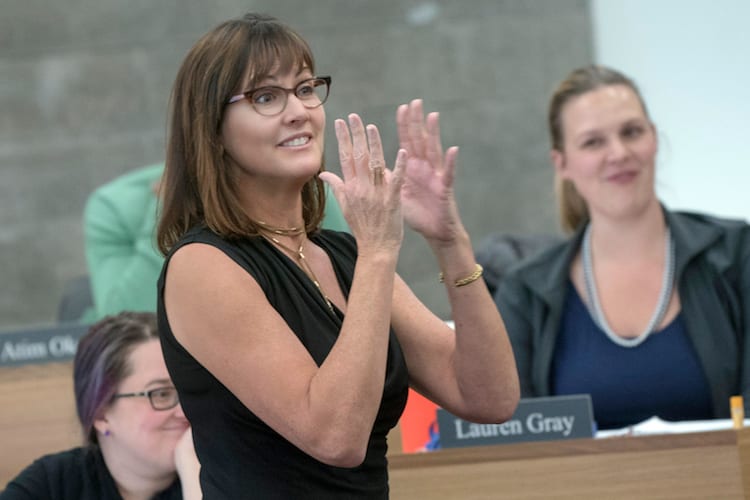
Kellie McElhaney has for years built the case that when businesses fail to diversity their leadership, or don’t treat men and women equally, they risk their bottom line. Now, she’s launching a breakthrough new center to put that data—as well as the deep Haas faculty research expertise—to work.
“The economic case for supporting workplace diversity and women in business has never been stronger,” said McElhaney, an associate adjunct professor at Haas, who is launching the new Center for Gender, Equity & Leadership (CGEL) on Nov. 6. “Women, underrepresented minorities, and the LGBTQ community face systemic structural, cultural, and individual barriers to opportunities and advancement. We will work to identify and tackle these problems and develop an evidence-based playbook.”
The center’s goals include bringing leaders from diverse political and corporate backgrounds together to discuss advancing gender and diversity in policy and business; engaging male and female allies and uniting people at the intersection of all ethnicities, races, and classes around a shared goal of gender and diversity equity; and developing leaders who understand that gender is a spectrum, not a binary construct.
Four alumni who are active in gender and equity leadership will speak at the launch event: Larissa Roesch, MBA 97, vice president and portfolio manager at Dodge & Cox; Nikita Mitchell, MBA 15, founder of Above the Bottom Line & senior manager of strategy & planning at Cisco; Kate Morris, MBA 14 lead, people & inclusion at Adobe; Brandon Doll, MBA 14, vice president, strategy and business development for the Oakland Raiders. (RSVP for the launch event here)
Tapping Haas faculty research expertise
McElhaney’s leadership team includes Prof. Laura Kray, who studies gender stereotyping and negotiations, and Prof. Laura Tyson, faculty director of the Institute for Business & Social Impact, who has written extensively about how gender equality worldwide is associated with better education and health, higher per capita income, faster and more inclusive growth, and greater international competitiveness.
While the center will support and explore new research, existing research by Haas faculty members runs deep.
McElhaney, who currently teaches a course called “The Business Case for Investing in Women,” conducted 2016 research with Genevieve Smith on the zero percent pay gap between men and women at the Gap, Inc. Meantime, research by Prof. Clayton Critcher detailed the multiple negative consequences of concealing one’s sexual orientation at work; Kray’s recent work outlined how fixed beliefs about gender roles preserve the status quo; and Prof. Jennifer Chatman detailed how political correctness in the workplace encourages men and women to be more creative by reducing uncertainty in relationships.
Moving the needle
McElhaney came up with the idea for the center four years ago, and raised funds with the encouragement of Dean Rich Lyons. “I started doing research on what other schools were doing, and what we could do to truly move the needle and be disruptive,” she said. “While other schools are focusing more on diversity or counting the heads, we are focused comprehensively on inclusion in our classrooms—through our cases, our choice of course speakers, our faculty teaching methodology, and our student culture.”
McElhaney’s successful campaign led to $1.6 million in donations, including a founding corporate gift from the Gap Foundation.
CGEL has no shortage of timely issues to focus on, from pay inequity to maternity leave to the continued low representation of women in leadership roles—not to mention the daily headlines revealing the latest sexual harassment accusations in the business world. Only 5.6 percent of CEOs at S&P 500 companies are women (and as of March 2017, only two were women of color). Women account for only 20 percent of board seats and 20 percent of C-suite positions in these companies.
“The majority of CEOs include gender equity among their Top 10 priorities, yet boardrooms and C-suites are not changing quickly enough,” Lyons said. “While the commitment to diversity and an inclusive work environment is there, too few have a handle on solutions. Our new center will work toward immediate change in these areas and pave the way for future generations.”
Jamie Breen, assistant dean of the MBA program for working professionals at Haas and a CGEL founding advisory council member, said she’d like to know why the drop-off rate for women on the path to upper leadership tracks increases significantly at the VP to SVP level.
“We used to think that getting women into very senior leadership positions was a pipeline issue—if we got women into the pipeline, it would take care of itself,” she said. “We now know that is not the case. We have systemic issues, and we need to understand the unwritten rules and practices that drive these outcomes and, more importantly, how to make them explicit and change them.”
To help make these changes, the center will invite corporate leaders for round table discussions, sponsor new research, work with teams of student consultants on real-world business challenges or case competitions, place faculty as conference speakers, and provide scholarships/fellowships.